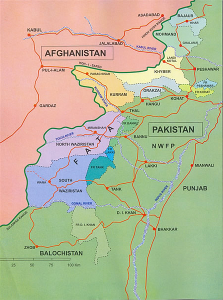
Map of the Federally Administered Tribal Areas in Pakistan. Note Orakzai and North Waziristan are as close as 50 milies in some spots. (Wikimedia Commons)
Today, US drones killed four more people in North Waziristan in Pakistan’s Federally Administered Tribal Areas (FATA). This strike comes at a critical time in US-Pakistan relations, as many believed that the US and Pakistan would announce an agreement reopening NATO supply routes through Pakistan at last weekend’s NATO summit in Chicago. Instead of reaching agreement, however, Pakistan’s President Asif Ali Zardari was essentially shunned at the meeting. Today’s strike adds to that insult, as Pakistan has been objecting strenuously to US drone strikes as an imposition on Pakistan’s sovereignty. Despite US claims that Pakistan does nothing to stop insurgents in the FATA, Pakistani jets also killed 12 people today in Orakzai Agency, which is near North Waziristan and also within the FATA.
Drone strikes in Pakistan by the US have occasionally been interrupted by various diplomatic issues. For example, there was a lull of over a month at the height of negotiations over the release of Raymond Davis. One of the most notorious US drone strikes was on March 17, 2011, the day after Raymond Davis was released. This signature strike killed over 40, and despite US claims (was that you, John Brennan?), that those killed “weren’t gathering for a bake sale” it was later determined that the majority of those killed were indeed civilians at a jirga to discuss local mineral rights. Because it was so poorly targeted, this strike always stood out in my mind as the product of an attitude where high-level US personnel demanded a target, no matter how poorly developed, simply to have something to hit since drone strikes had been on hold over the Davis negotiations and there was a need to teach Pakistan a lesson.
Not too long after that strike, another strike seemed to be timed as a response to negotiations gone bad. On April 13, 2011, there was a drone strike in South Waziristan that occurred while Pakistan’s ISI chief was in transit back to Pakistan after discussions with the US over drones was cut short.
With those strikes as background, today’s strike may well be another example of the US deciding to send in a strike to make a political point. The Guardian seems to see the strike in the same way, and notes how the strikes may affect negotiations:
The attack came as Washington runs out of patience with Islamabad’s refusal to reopen supply routes for Nato troops in Afghanistan.
US drone strikes have complicated negotiations over the routes, which Pakistan closed six months ago in retaliation for US air strikes that killed 24 Pakistani soldiers along the Afghan border. Pakistan’s parliament demanded the strikes stop after the attack, but the US refused.
Besides the issue of the supply routes, Pakistan also has angered many in the US with its arrest of Dr. Shakeel Afridi, who helped the US in its operation to kill Osama bin Laden. Afridi was sentenced today to 33 years in prison on treason charges arising from his work with the US. It’s not clear whether the sentence was announced before or after the drone strike, but it was known in advance that sentencing was scheduled for today. [h/t to Marcy for mentioning the sentencing as another potential political issue relating to today’s strike.]
A major sticking point in US-Pakistan relations is whether Pakistan will attack insurgents. Today’s killing of twelve in Orakzai argues against US accusations somewhat. However, the insurgents targeted there are most likely from the the Taliban branch known as Tehreek-i-Taliban Pakistan (TTP), which attacks Pakistani targets while the Haqqani network in North Waziristan (the two agencies are less than 50 miles apart at some points, see map above) tends to use Pakistan as a base for attacks in Afghanistan. Interestingly, TTP and the Haqqani network occasionally fight one another, as well. At any rate, Pakistan claims they have cleared most of Orakzai in the report on today’s attacks:
Security sources say over 92 per cent of Orakzai has been cleared of militants in the ongoing military operation in the region.
Moving on to clear North Waziristan would go a long way toward breaking the diplomatic standoff, but would require breaking what many accuse to be close relations between the Haqqani network and elements of the ISI.
At any rate, with the added insult of a new drone strike, don’t look for the supply routes to reopen this week.